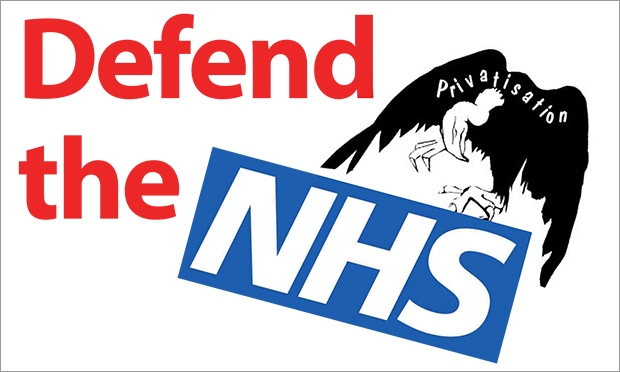Download the Save Our NHS leaflet
Britain’s National Health Service strives to provide excellent care to all, from the cradle to the grave, free at the point of use, regardless of ability to pay.
This outstanding achievement is lauded and appreciated by workers, but our love for the NHS is not shared by the capitalists and their political puppets, because, by denying opportunities for profit-taking, it’s ‘bad for business’.
Engineering a crisis
Following decades of sustained attack by successive governments, cracks in the system are rapidly expanding. The Health and Social Care Act 2012 aimed to finally dismember the NHS by removing the government’s statutory responsibility to provide care, and by compelling small groups of fundholding GPs (clinical commissioning groups) to seek bids from private companies. Nationally-planned provision has been jettisoned.
CCGs rely on financial ‘consultants’ to plan service provision – and these firms unashamedly advance the agenda of private health and the insurance industry. Richard Branson’s Virgin Care now not only runs England’s largest GP practice (with over 3 million patients), but also the East Kent Hospitals foundation trust. Reducing staff pay and cutting services is key to delivering healthcare at a profit.
Meanwhile, the NHS is being carved up into isolated business units (foundation trusts) that are compelled to reduce costs or face financial penalties. Despite all the cuts they’ve made, every single one of Britain’s NHS trusts is now in financial deficit, and the new ‘Sustainability and Transformation’ plans (STPs) are the final nail in the coffin, cutting £2.5bn nationally in 2017 from the NHS budget and £22bn by 2020.
Payouts to pharmaceutical companies, equipment suppliers and PFI loansharks in reality account for all the ‘increases’ in funding for health over recent years. Meanwhile, frontline services continue to be cut, and widespread pay freezes threaten to make working in the NHS economically untenable.
Bursaries allowing working-class nurses and midwives to train have been scrapped, and junior doctors, despite spirited initial resistance, tacitly accepted a massive 30 percent pay cut in 2017. Despite the negative media spin, doctors received overwhelming support for their strikes.
The health secretary’s call for ‘seven-day working’ was widely understood to be a fraud, the NHS is already a 24/7 service. Hunt’s call for more work for less pay by the same or fewer staff is clearly a cut, presented as ‘service improvement’.
Privatisation and profiteering
A superficial analysis attributes these policies to the personal malice of one minister or another. Hunt was a recent bogeyman, as Lansley was before him, but it was Labour health secretary Dobson who burdened the NHS with the millstone of Private Finance Initiative debt that is steadily dragging the NHS down.
Labour under Corbyn, despite its overt ‘support for the NHS’, has not made any meaningful commitments to reversing the policies that have gutted the NHS. It cannot, as to do so would challenge the capitalist order – a fight it cannot even hint at.
In 2018, Britain’s annual PFI repayment reached a staggering £10.1bn, as we were forced to repay up to 12 times the initial sums ‘loaned’. This usury is quite literally costing lives, and scrapping it could save the NHS, yet none of our ministers will be persuaded to ‘see sense’: servicing capital is their goal, not safeguarding our health.
Capitalist vs socialist medicine
Tory MP Andrew Bridgen and other prominent commentators have denounced the NHS as a ‘Stalinist’ or ‘communist’ organisation. It is time we used these statements not to trash the NHS, but to look again at the fundamental difference between capitalism and communism.
The NHS was in fact modelled on Soviet medicine, and is another thing we owe to the 1917 October Revolution in Russia. The Labour party claims credit for creating the NHS, but it was actually part of the post-war consensus – a ‘welfare’ concession made by British capitalism owing to the relative strength of the working class in 1945.
At that time, the Red Army had defeated Nazi fascism and Soviet socialism had proved its superiority by providing rising living standards when workers elsewhere were enduring the miseries of the great depression.
The model of capitalist medicine now being enthusiastically pursued by our rulers is the US model: entirely privately-owned, it’s the most expensive and inefficient in the world, costing $6,719 per person per year while leaving 50+ million Americans uninsured and many millions more underinsured. Obamacare, far from alleviating this shameful state of affairs, has compounded it.
The socialist alternative can be seen today in countries like Cuba, where publicly-owned, universal healthcare is delivered for just $362 per person per year, and achieves population health statistics that surpass those of developed countries. The difference? At no point in the Cuban system is there anybody who is driving up costs by making a profit.
With the USSR’s collapse and the brutal suppression of trade unions and workers’ parties, however, capitalists no longer feel compelled to make concessions to British workers, who seldom now even dream of revolution.
How can we save our NHS?
Many campaigns that have sprung up to defend the NHS, while welcome, have a tendency to be too narrow in scope and to allow themselves to be misled by politicians’ promises.
Only by clearly understanding our rulers’ determination to dismantle the NHS and by coordinating our efforts to save it can we hope to succeed.
We must demand:
1. the immediate scrapping of all PFI debt;
2. the scrapping of the ‘internal market’, which pushes privatisation, not ‘efficiency’;
3. the scrapping of the STPs and their associated cuts;
4. the scrapping of foundation trusts, CCGs etc, which act as businesses first and health providers second;
5. the reintroduction of integrated health planning, commissioning and provision on a national and regional level by the NHS;
6. an end to the private provision of healthcare, which doesn’t ‘add choice’ or ‘increase overall health funding’ but only adds cost, and ultimately deprives the poor of healthcare;
7. an end to pay freezes and ‘restraint’ and to the tearing up of national employment contracts and frameworks;
8. the nationalisation of all drug and medical technology companies.
It has long been the case that while public debt is social, profitable enterprises are in private hands.
The CPGB-ML believes that the welfare of workers can only be safeguarded by a socialist system of economy, controlled and administered by the working people themselves.
Let the capitalists’ ministers try and show us otherwise; let them start by meeting this list of simple demands.














